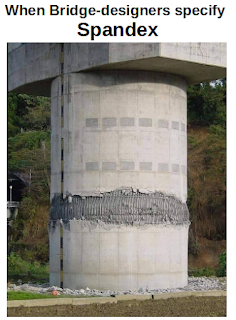Don't take this as the final word on the subject. My hope is that my readers who have more experience on the subject will chime in.
My gut-feel is that I have 400 hard-core readers. I also estimate that 10% will have at least as much experience as I have "sleeping rough" in cold weather and 5% or twenty of you will have a LOT more experience.
Tip #1: Contrary to what your physics teacher told you, Heat goes down
Dead-air spaces insulates. Weight crushes the dead-air spaces out of insulation. Climb into a standard sleeping bag on a snowy surface and 80% of your body-heat will leave your body DOWNWARD. More insulation on top of you will not save your bacon if you are losing 4/5ths of your heat downward.
The standard inner-spring mattress is a miracle but it doesn't always translate well to "rough sleeping'.
A cot with skirting around the perimeter and ANYTHING dry to create a dead-air space (like garbage bags filled with crumpled newspaper) beneath it WILL save your bacon. Heck, you could throw empty, aluminum beverage cans beneath the cot and it would serve the purpose.
In even more austere situations, piling up dry leaves or straw or corrugated cardboard is an option.
Tip #2: Wet kills
Wetness, regardless of the source, destroys insulation's ability to retain heat. Whether it is from rain or snow-melt or condensate from breathing or sweat. Dampness is your enemy. Even with exotic, synthetic fibers.
Tip # 3: Wind kills
If there is no wind, then the layer of air closest to your skin warms and it will (slowly) move away due to very slight differences in air density. Wind-speed brooms away that warm layer and your heat losses go crazy.
Tip #4: Infrared losses are real
Cloudy nights are much warmer than clear nights. Often to a tune of 20F-to-30F. If you have already addressed insulating yourself from the ground, and have strategies to stay dry and are exploiting terrain, vegetation and structures to kill the wind...then suspending a reflective layer like a space blanket or a poncho with a layer of aluminum foil glued to the lower surface 18 inches above your body (or if resources are limited, above your face) can make a big difference.
Little "cheats"
Body warmers can be your friend. Maybe not every night but certainly on the coldest ones.
If you have access to 110V, then an electric blanket or a "massage mat warmer" is heavenly. They use about 60 Watts but a huge percentage of it warms you instead of your bedroom's walls.
If you have a spouse, they are good for about 100 Watts but much of it will escape in other directions.
If you don't have a spouse, dogs are the next-best alternative. "Three Dog Night" refers to a way to stay warm on the coldest of nights.
If you do not have a spouse (or if she objects to your custom of eating pickled eggs and herring before turning in for the night) and if your dogs ran away, then eating a modest meal that is high in fat shortly before turning in for the night might be an option. You DON'T want to eat so much that you need to make a trip to the outhouse, however.
If resources are limited, then if you can only add "extra insulation" to one thing, insulate your head, face and neck.
If you have enough resources to insulate two areas, head-face-neck and trunk.
The big fake-out is that we feel cold in our extremities first. That is because our bodies are smart and they shut-off blood flow to the extremities first. Fingers, toes, hands and feet can drop down to 34 degrees (and be painful) but have little overall impact on our chances of survival. The same cannot be said for our heads or our core-body temperature. The "head-fake" is that people address hands-and-feet when they should be addressing the more important parts.
Using day-clothes as insulation for sleeping
Opinions differ. My inclination is to use them ON TOP of the stack of blankets/sleeping bags to keep them drier UNLESS the temperatures are dire.
Summary:
Pick a "camping place" that will protect you from moisture (whether from precipitation, snow-melt, driven by wind or from condensation.
Pick a "camping place" that gets you out of the wind.
Have a plan to get up, off the ground and to insulate beneath you. Prosecute that plan aggressively.
Place a canopy or second, inner tent above your body to reflect infrared losses back to your body. If resources are tight, concentrate on protecting your head which is typically the most exposed (and highest priority) part of your body.
Have several rescue or go-to-hell plans in case the temperature drops to -35 F. Candy bars, hand/body warmers, hot water bottles etc.
Having a plan to avoid having to go outside to visit the latrine is pure gold. A "piss bottle" if you are a guy, for instance or a toilet-seat-on-a-bucket if you are of the fairer sex.
***
My hope is that my readers whose experience dwarfs my own will pipe up and say "Blah, blah, blah is BS. This is what you SHOULD do" or "Don't try to supress shivering. If your body tells you it wants to shiver, don't argue with it..." or "Be extra careful to not get sweaty before turning in. Sweat is moisture..."
This is a GREAT time to share stories of those times when you were the coldest or had to survive the coldest night of your life.





















